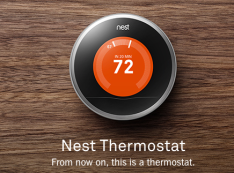So what if Google bought a thermostat?
Google’s first major foray into the Internet of Things shows the future for marketers, but Scott Heron asks should you be getting on board?
This week we had 40 degree heat in Melbourne for the Australian Open, meanwhile in Silicon Valley, Google spent US$3.2 billion on a company called Nest. But how are these things connected?
Nest is a company that offers a number of digital home products, including smoke alarms and thermostats. With Nest, I could have regulated my thermostat remotely. When leaving the tennis grounds, I could have used my mobile to turn my air conditioning on to ensure my place was cool upon my arrival.



Social Media Madness
I have Instagram, Twitter and Facebook. I guess that makes me an ‘instant Twit-Face’. Are these social networking sites a ‘modern form of madness’? Are they making us less human by isolating us or simply allowing us to stay connected to and in touch with friends and family? Facebook is losing its dominance as the most popular social network with young people. More than 11 million young people have fled Facebook since 2011 and Instagram, Tumblr, Snapchat and Whatsapp are gradually gaining steam with young users.
I have no idea why, considering I personally find the need (or compulsion) to check my Facebook newsfeed at least twice every hour. That’s EVERY hour, of EVERY day, of EVERY week. Omg?? Does that mean I have a ….wait for it…DIGITAL ADDICTION? Answer- probably! Mark Zuckerberg, what have you done? What have you created, it’s all YOUR fault!
Instagram a free mobile app which allows users to take and post photos that resemble Polaroids now has more users than Twitter, a huge jump in the photo-sharing app’s popularity. A picture speaks a thousand words, so it’s no surprise that Instagram came through the back door into people’s everyday lives and took off like a rocket. And the reason for its popularity? The attention-seekers among us don’t have to find any words, we Instagram our breakfast, the cat, the sunrise, our lunch, our new fake eyelashes and the hot guy working out at the gym. Instant gratification.
I don’t think it’s fair to blame Mark Zuckerberg for the fact that we edit our Facebook profile pictures as if the album is a portfolio of our life experiences that are just about to be judged. And I know I’m not the only one. I know there are millions of people out there constantly renovating their profiles, statuses, tweets and regrams in the hope of altering their identity. The time we have invested into these online profiles to reflect who we want to be, is time wasted that we could be spending embracing who we actually are and what we want to gain from life. Why do the opinions of other seem to matter so much nowadays? Feeling whole and complete as a person should never rely on someone ‘liking’ ‘following’ ‘sharing’ or even commenting on issues that matter enough that we share them with the world. My ‘About Me’ section will never do me justice. Regardless of how many times I share an abused child news story, nobody will ever feel my heartbreak. Regardless of how many times I tweet the lyrics to my favourite song, I can’t express what those words really mean. And no matter what photo effect I apply to my poised and polished face, no one will appreciate the beauty within me.
The real Deirdre Porter exists outside of the confines of a Wi-Fi connection and you don’t need a username or password to get to know me… just say hello. See you offline.
Here’s a challenge – can we work out another way to advertise on these new platforms?
It baffles me that whilst technology continues to grow, advertising is still using the ‘click through’ method.
If we engage with services like Nest, and my fridge tells me to touch the door to see more about [insert product here], or wait 30 seconds before I can open the door … lets just say a Coolgardie Safe will be more appealing than Nest.
I am not sure what difference would the “Internet of things” make for the marketers unless there is a way to sell to the fridge directly.
Marketing just underwent huge transformation from a handful of channels to their multitude with increasing targeting accuracy and depth of interaction. It needs to catch its breath and learn how to use the tools it already has.